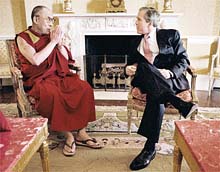
May 24, 2001
Dalai Lama Tells Bush Independence Is Not a Goal
By DAVID E. SANGER
|
 ASHINGTON, May 23 — Today, as China celebrated the 50th anniversary of its annexation of Tibet, President Bush met the Dalai Lama, Tibet's exiled spiritual leader, and joined his protest of Beijing's efforts to dilute the region's ethnic identity.
ASHINGTON, May 23 — Today, as China celebrated the 50th anniversary of its annexation of Tibet, President Bush met the Dalai Lama, Tibet's exiled spiritual leader, and joined his protest of Beijing's efforts to dilute the region's ethnic identity.
Mr. Bush met the Dalai Lama in the Yellow Oval Room of the White House residence, an apparent effort to make the encounter look just shy of an official session. But the subtlety is not likely to impress Beijing, which has denounced the meeting with the Dalai Lama and the visit to New York on Tuesday of Taiwan's president, Chen Shui-bian. White House officials said the timing of the two visits was coincidental.
Both leaders are associated, even while they deny it, with independence movements, and one senior administration official said today that "this is not a week bound to make the Chinese very happy."
As he stopped to talk to reporters on his way out of the White House, the Buddhist monk said he asked Mr. Bush, whenever the president met China's leaders, to "assure the Chinese government that I am not seeking independence." As he spoke an aide kept an umbrella over his head to protect him from the sun.
He has insisted on autonomy for Tibet, which has been occupied since 1949. It was in 1951 that China issued a declaration that Tibet was formally a part of China. The Chinese argue that economic conditions in Tibet are greatly improved under Chinese rule. But Tibetans and their well-organized, well-financed lobby here in Washington argue that the economic development has been matched by a systematic effort by China to wipe out Tibetan culture, and thus crush the autonomy movement.
In meeting the Dalai Lama in the residence, Mr. Bush was offering a slightly warmer welcome than President Clinton did. As president, Mr. Clinton would arrange a meeting with the Dalai Lama, a Nobel peace laureate, with other United States officials, and then "drop in," as if by chance. The arrangement fooled no one, but enabled the United States to tell Beijing that the religious leader did not have a formal appointment with the president.
Asked today about how Mr. Bush differed from other presidents he has met, the Dalai Lama smiled, paused, and said: "Basically the same."
Mr. Bush's spokesman, Ari Fleischer, said in a statement today, "The president said he would seek ways to encourage dialogue and expressed his hope that the Chinese government would respond favorably. "The president also reiterated the strong commitment of the United States to support the preservation of Tibet's unique religious, cultural and linguistic identity and the protection of the human rights of all Tibetans," the statement said.
The Dalai Lama lives in exile in India, though he travels the world calling for dialogue with Chinese officials. They have refused, saying that he must first accept that Tibet is part of China — just as they seek Taiwan's unequivocal statement that the island is part of China.
Mr. Bush appeared to tilt toward Taiwan last month, when he said that the United States would do "whatever it takes" to defend the island if it came under Chinese attack. He and other American presidents have never made such a claim for Tibet. But by meeting with the Dalai Lama today in the official residence, President Bush will certainly be perceived in China as sympathetic to the Dalai Lama's cause.
